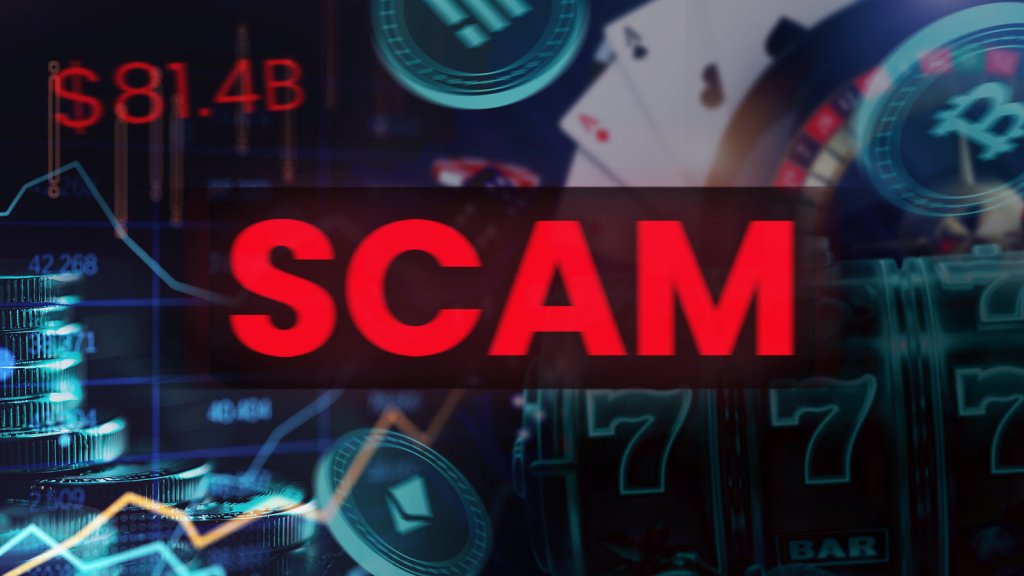
Crypto Casino Scams Reach Record $81.4B in Illegal Revenue
All the information in this page was checked by:
Every piece of information we present is rigorously verified by our team of experts using multiple credible sources, ensuring the highest level of accuracy and reliability.
We have paid partnerships with the online casino operators featured on our site. We may also earn commissions when users click on certain links. However, these partnerships do not affect our reviews, recommendations, or analysis. We remain impartial and committed to delivering unbiased gambling content.
Learn moreAccording to figures from Yield Sec reported by the Financial Times, illegal crypto casinos had generated about $81.4 billion as of 2026. Overall, this places crypto casinos among the largest unregulated sectors globally. These operations continue to run despite multiple bans in regions such as the U.S., China, and the EU because most users bypass these restrictions with VPNs, anonymous wallets, and third-party crypto tools. This article serves as a real warning about the financial risk, data exposure, and criminally untraceable operators.
- Why Illegal Bitcoin Casinos Keep Growing (Even as Regulators Chase Them)
- The Hidden Dangers of Unlicensed Crypto Gambling
- The Legal Clues Most Players Miss When Joining a Crypto Casino
- Recovery Procedures: What to Do If You’ve Been Scammed
- What CasinoAlpha Does to Block Illegal Crypto Offers
- Final Verdict – Is It Ever Safe to Use a Crypto Casino?
Why Illegal Bitcoin Casinos Keep Growing (Even as Regulators Chase Them)
Crackdowns fail as illegal crypto casinos grow by providing anonymity, inflated odds, and fake licenses. Regulators go after shadows as $81.4 billion flows through offshore Bitcoin casinos. This section analyzes why these sites are still running among safe online crypto casino sites.
Why Players Keep Joining Illegal Crypto Casinos
Illegal casinos are not surviving by mere luck, they are designed to remove every hurdle legit casinos you join throw at you. This is how they lure international players:
- No KYC: What players need to get started at unlicensed gambling sites is an email and a wallet address, no ID uploads or verification queues.
- Complete anonymity: You play through Web3 integrations or proxy wallets that are more difficult to track.
- Instant cashout: Marketed as real-time payouts, but in most cases, it’s often exaggerated since transactions can be delayed off-chain.
- Massive bonuses: Welcome packages including a deposit match of 300%-500% and daily cashbacks
- Sleek mobile-first interface: Mobile-optimised websites that have clean UX, load fast, and are dApp-ready
- Global access: Players from all over the world can access these sites and gamblers in restricted regions can use a VPN.
These crypto gambling scams 2026 don’t look suspicious until you try to cash out and witness multiple delays, this is when you realize that their unregulated nature helps them get away with anything.
How These Casinos Fake Being Licensed & Safe
The biggest crypto casino risk is how they effectively pretend to be legitimate, fooling even experienced crypto users with different trust-building tactics. First off, offshore Bitcoin casinos display fake or expired licenses from Curacao, MGA, or Anjouan that appear legitimate at first glance, unlike the licensed and secure Bitcoin casino sites.
Additionally, many of these crypto casinos use sophisticated AI-powered live chatbots that convincingly act like professional support teams, responding with a high degree of confidence to many basic enquiries.
Finally, we believe this to be the most deceptive, and it is how they include trust seals and prominent regulated by statements with no actual proof or licensing number to verify, relying on the fact that most international players won’t check these claims before depositing their crypto.
What Legal Crypto Casinos Provide vs. What Illegal Ones Skip
| Feature | Licensed Crypto Casino | Illegal Crypto Casino |
|---|---|---|
| License Verified | Yes (MGA, Curacao, Anjouan, etc.) | Often fake, expired, or untraceable |
| KYC & AML Procedures | Full ID verification before withdrawals | Skipped or only enforced after big wins |
| Responsible Gambling | Deposit limits, loss tracking, RG tools | Absent or non-functional |
| T&Cs Transparency | Public, timestamped, with specific examples | Vague, regionless, sometimes contradictory |
| Support Channels | Escalation options, multiple languages | Telegram, slow email, or AI-only chat |
| Payout Transparency | Exact cashout times & max win caps disclosed | Instant claims, but delayed backend flow |
Crypto players are not making reckless decisions when choosing; they’re just being misled by illegal crypto casinos that appear legit. The casino replicates all the signs of safety, but when tested, its whole façade falls apart.
Why Regulators Can’t Catch Up
Regulators face a difficult challenge in dealing with illegal crypto casinos because they become more sophisticated with each attempt to stop these sites. The numbers tell a sad story: Despite increased regulatory attention worldwide, illegal crypto casino revenue rose from $16.3B in 2022 to a staggering $81.4B in 2024.
It’s not like regulators are folding their arms and making no moves to shut down these sites. The truth is that these sites are decentralized, elusive, and sophisticated, making traditional approaches useless.
With unlicensed gambling sites, the problem lies in technology, because these platforms are migrate their domains easily using blockchain hosting, making traditional site shutdowns ineffective.
Global Enforcement Gap Snapshot
| Region | Active Illegal Sites | Shutdown Rate |
|---|---|---|
| United Kingdom | 456 | 41% |
| European Union | 1,890 | 29% |
| United States | 1,247 | 34% |
| Asia-Pacific | 2,340 | 18% |
As the budget to clamp down on illegal crypto casinos rises, the crypto gambling ecosystem, which was specifically built to evade regulators, decentralizes faster than these agencies can keep up.
The Hidden Dangers of Unlicensed Crypto Gambling
- Wallet locking: Your entire deposit becomes unusable after claiming a bonus, with no way to void the bonus and withdraw your money. Our 2024 testing found this practice in 42% of offshore Bitcoin casinos. This is why you should learn the red flags of crypto sites.
- Bonus Expiry Deception: The countdown timer on bonus offers begins running before you even accept or use the bonus, often expiring before you realize it’s active. This deceptive practice appeared in 28% of unlicensed gambling sites we tested. Unlicensed casinos do not play by the rules; they can change bonus terms, such as when the timer starts counting or when the bonus expires.
- KYC Triggered at Cashout: Crypto gambling sites advertised as anonymous or no KYC needed will suddenly request extensive identity verification when you try to withdraw large winnings. During a testing round, after winning 1.2 ETH at a new casino that advertised No KYC Gambling, we were suddenly asked to provide a passport, utility bills, and source of funds documentation, but this was never mentioned earlier.
- Withdrawal Stall: Cashout requests that should be instant or take at most 24 hours suddenly enter an unexplained processing state for days or weeks with no transparency or timeframe, often leading to eventual rejection. This was the most common issue that we found in 71% of unlicensed gambling sites.
The Legal Clues Most Players Miss When Joining a Crypto Casino
A well-designed site does not mean legitimacy. We believe real security lies in legal transparency, but illegal crypto casinos avoid this at all costs.
Use the table for a 60-second legal audit before depositing:
| Legal Element | What Safe Sites Show | Red Flags at Illegal Sites |
|---|---|---|
| License Info in Footer | Real jurisdiction + license number | Fake logos, a generic badge, or none |
| T&Cs with Date/Version | Full, timestamped, and regularly updated | Vague, undated, or missing entirely |
| Payment Terms Listed | Clear deposit/withdrawal rules, processing times | Instant payouts with no actual policy |
| RG Policy Link | Active, responsible gambling tools + support | No RG section or broken links |
| Jurisdiction Disclosure | Explicitly states where they operate legally | Available worldwide (no real jurisdiction) |
You can also check out our guide to get the clues for joining a fake crypto casino.
Recovery Procedures: What to Do If You’ve Been Scammed
This section covers what you should do in the first 24 hours if you just got scammed by one of the illegal crypto casinos. Additionally, we added how you can get help in your region.
Immediate Response Protocol (First 24 Hours):
Hour 1-2: Evidence Preservation
- Screenshot balance and history
- Download blockchain transaction IDs, wallet addresses, and timestamps.
- Save evidence of all communication (emails, live chats, and support tickets).
- Archive the website where you got scammed, you can use tools like Archive today.
Hour 2-4: Financial Protection
- Freeze all linked wallets and revoke smart contracts.
- Contact your payment processors if you used fiat currency to make the payment.
Hour 4-24: Regulatory Reporting
- File complaints with the UKGC or MGA.
- Report to financial crime units like FBI IC3, Europol, and Action Fraud
- Submit blockchain evidence (use Chainabuse or CipherTrace if available)
Recovery Strategy by Jurisdiction:
| Region | Primary Authority | Success Rate | Average Recovery Time |
|---|---|---|---|
| United States | State Gaming Commissions, FBI, IC3 | 23% | 6-18 months |
| European Union | National Gambling Authorities & Europol | 31% | 4-12 months |
| United Kingdom | UKGC, Action Fraud | 34% | 3-8 months |
| Canada | Provincial Gaming Authorities | 28% | 5-14 months |
Legal Recourse Options:
- Regulatory Complaints: Submit a detailed report to the gambling authorities where the casino got licensing, even if you suspect the license was fraudulent. While they can’t force an offshore operator to pay, they can issue blacklists, start investigations, or help you build a legal case.
- Financial Crime Reports: Use national cybercrime portals (like FBI IC3 or Action Fraud) to report financial theft or fraud. These agencies can help you track wallet and also work with international partners.
- Chargeback Procedures: If you used credit cards, request chargebacks for services not provided or fraudulent merchant. For cryptocurrency, there are no direct chargeback, but some centralized exchanges may assist you with flagging this scam addresses.
- Civil Litigation: In cases where you lost few thousand dollars, you can take legal steps via international law firms that specialize in crypto disputes.
- Blockchain Recovery Services: There are dedicated firms that can help you trace and recover cryptocurrency through forensic blockchain analysis, but their success varies widely, and their fees can be quite high.
What CasinoAlpha Does to Block Illegal Crypto Offers
At CasinoAlpha, we apply a four-step verification for every crypto casino we test before listing because you must understand how crypto really works before you play. Our process goes beyond basic checks to ensure we never recommend unlicensed gambling sites to our readers.
| Filter | Description | Must-Pass Rule |
|---|---|---|
| License Verification | Manually checked regulator database | Active, publicly registered |
| Bonus Terms Audit | Tested for hidden rollovers, changes, or unfair conditions | Fair, Enforceable |
| VPN Cloaking Test | Confirmed no region-switching to bypass licensing restrictions | Geolock Compliant |
| Withdrawal Verification | Real-money withdrawals processed under test conditions | Timely, Full Payouts |
We don’t list because a site or bonus offer looks good. Here, we understand crypto casino risks and list only after we’ve triggered the terms, withdrawn the crypto, and verified the license.
Final Verdict – Is It Ever Safe to Use a Crypto Casino?
Crypto casinos are not inherently dangerous; it’s the unlicensed gambling operators running illegal crypto casinos that pose a real threat. Casinos licensed by UKGC or MGA are safe to use as long as you verify their licensing information.
At CasinoAlpha, we take player safety seriously. Every crypto casino we list is fully licensed, tested, and payout-confirmed. If you want to enjoy crypto gambling without risk, start with platforms that passed our filters.

